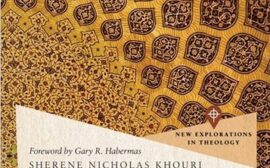By: Daniel Merritt, Ph.D. Th.D. | July 29, 2022
No one likes to talk about divine wrath. We would rather talk about God’s love, mercy and grace. However, when one reads through the Bible one discovers in the teachings of Jesus the element of judgment is clearly prevalent, actually being a sign of God’s love. For divine love doesn’t dismiss sin, but deals with it in judgment. Since the Bible teaches the reality of divine wrath, it behooves us not to ignore the subject.
It must be remembered that God’s purpose in executing judgment is redemptive. While in judgment sin is punished, in His holy love judgment seeks to eradicate sin and establish holiness. God’s wrath is holiness’ response to sin. Holiness is repulsed at sin and must deal with it. Judgment is God’s holiness in opposition to sin. God’s love redeems in the midst of judgment to establish His holiness. Divine wrath is anchored in holy-love. His love is so great He at the cross dealt with sin in His Son. At the cross we see judgment upon sin and the redemptive love of God from sin. The judgment of God is an aspect of His love. God’s judgment and love are not opposed to one another, for there can exist no true love without judgment on sin. God is not passive in the face of sin, but is actively opposed to evil. God’s wrath against sin arises out of His nature of holy-love.
Even from a casual reading of the Bible one discovers the inspired text teaches that found in the character of God is the expression of wrath. One learns from reading the first few chapters of Genesis that man was placed in a perfect environment, the Garden of Eden, and walked in harmony with his holy and loving Creator. In time man, by his own choice, deviated from God’s moral order and sin entered the world. As result of man’s deliberate rebellion, division, disease, devastation, and death made their entrance upon the earth. Not only was man cursed by sin, all creation was thrown out of balance and groans in anguish (Rom 8:22). Because God is holy and created man and all creation to function within His established holy and moral order, when that balance was violated the fall of man and a fallen creation resulted, and it threw our existence on earth out of kilter.
The widespread effect of the fallenness of humanity, resulted in the expression of God’s “wrath” being manifest against “fallenness.” How was/is God’s wrath expressed? While theologians may use different terminology and categorize the expression of God’s wrath differently, this writer for simplification divides the expression of Divine wrath into four categories: (1) wrath as cause and effect of violating of God’s holiness and moral order; (2) wrath in the character and nature of God who actively opposes sin; (3) wrath as the consuming outpouring of God’s judgment upon unrepentant sin and sinners during the Great Tribulation; and (4) wrath in Christ’s great work on the cross.
Divine Wrath as Cause and Effect of Violating of God’s Holiness and Moral Order
First, wrath as cause and effect of violating of God’s holiness and moral order. God’s holiness is the standard of all that is morally right and wrong. Man has failed to give the Creator His rightful place in his life and has clearly defied His holiness and His moral order. When we violate God’s standards it sets in motion hostile consequences from the effect of human sin. C.H. Dodd and A.T. Hanson are major proponents of God’s wrath as the cause and effect of living contrary to divine law. They describe the wrath of God as “an inevitable process of cause and effect in a moral universe…. as the effects or consequences of sin” [1]
In other words, when we defy God’s holiness and moral order, adverse consequences inevitably occur. When one lives in direct violation of God’s divine law, they will negatively experience the “inevitable process of cause and effect in a moral universe.”
Divine Wrath in the Character and Nature of God Who Actively Opposes Sin
Second, wrath in the character and nature of God who actively opposes sin. While there is a sense in which all moral and natural calamities is an expression of God’s wrath in terms of the cause and effect of sin, His wrath is much more. God’s wrath can’t be reduced to simply the impersonal cause and effect of sin. The Apostle John tells us that God is love (I John 4:8). Can love and wrath reside together in God’s nature? The love of God and the wrath of God are not in contradiction, though there is a tension between them. For God is not just love, but holy-love at war with sin. The love of God will be seen as anemic unless seen in the light of God’s holiness and His hatred toward sin. Hanson says it well, “Absolute love implies absolute purity and absolute holiness: an intense burning light…. Unless God detests sin and evil with great loathing, He cannot be a God of Love.” [2]
The Bible clearly teaches God’s wrath is His expression of divine hostility to all that is sinful and opposes His holy-love. Seeing that sinful humanity abides under God’s opposition (wrath) to all that is evil which arises out of His very nature (John 3:36), P.T. Forsyth insightfully writes, “The love of God is not more real than the wrath of God. If we spoke less about God’s love and spoke more about His holiness, more about His judgment, we should say much more when we speak of His love.” [3] Forsyth continues, “There is no real intimacy with the gospel which does not bring a new sense of God’s holiness, and it may be long before we realize that the same holiness that condemns is that which saves. There is no new insight into the Cross which does not bring, whatever else come with it, a deeper sense of the solemn holiness of the love that meets us there.” [4]
There can be no love of God that is not holy, His wrath being His revulsion to evil and all that opposes Him. God’s wrath is rejection of sinfulness and vindication of his holy nature. If one rejects God’s wrath, one cannot fully understand His love. An awareness of the wrath of God creates enhanced gratitude for Hs love. In wrath God is active in opposing everything that threatens His holiness, and He is active in His purpose to lead humanity to embrace the Holy. J.I. Packer has written, “God’s wrath is a right and necessary reaction to objective moral evil.” [5] The active wrath of God against evil debunks moral relativism, and reveals to us that right and wrong objectively exists and points us to the consequences of our actions and need of repentance.
The Bible teaches us that God is actively involved in His creation and there are times when He brings about judgment and actively expresses His wrath through circumstances and situations in order to bring men to repentance. In such incidents God’s active wrath is an act of love to persuade men to repent of their sin which separates them from the His grace and mercy. God can and does use judgment to bring wayward sinners unto Himself and bring about purposes which are beyond our finite minds to grasp.
Divine Wrath as the Consuming Outpouring of God’s Judgment Upon Unrepentant Sin and Sinners During the Great Tribulation
Third, wrath as the consuming outpouring of God’s judgment upon unrepentant sin and sinners during the Great Tribulation. There are basically two Greek words used in the New Testament (NT) to denote God’s divine anger or wrath: θυμός (thumos) found 18 times in the NT and ỏργή (orge) found 36 times. While there are times the two are used interchangeably, there seems to be a distinction between the two words. Some scholars deny there is a distinction [6], but orge speaks of God’s wrath as a present reality, a steadfast opposition against sin, while thumos refers more to eschatological judgment as found in Revelation (Rev 12:12; 14:8, 10, 19; 15:1, 7; 16:1, 19; 18:3; 19:5). [7] Orgē suggests a more settled or abiding emotion, a passionate yet controlled opposition to all that is evil (John 3:36); while Θυμός (thumos) speaks of a burning, blistering, boiling-over and fierce anger, a passionate wrath that spills over like a volcano, as seen in Revelation and speaks of God pouring out His righteous wrath in the Great Tribulation on unrepentant sin and sinners who have refused His grace and love. [8]
Even though such fierce judgements are experienced during the Great Tribulation, it says of many hardened in their sin, “They blasphemed the God of heaven because of their pains and their sores, and did not repent of their deeds” (Rev. 16:11). Even in the outpouring of wrath (thumos), God’s fierce opposition to sin is an act of love for the redemptive purpose of restoring holiness and moral order in a fallen world.
Judgements that occur from the inevitable process of cause and effect in a moral universe as the consequences of sin are only a foretaste of events more horrific to come as revealed in the book of Revelation. The judgments of Revelation should arouse and alert our hearts to look for the return of the King of kings and Lord of lords.
Divine Wrath in Christ’s Great Work on the Cross
Fourth, wrath in Christ’s great work on the cross. In the act of the cross God has provided for humanity a remedy for sin and holiness’ judgment upon sin. The cure is found in Jesus Christ, who on the cross bore the full weight of our sin and all our fallenness entails. Since divine holiness responds and reacts to sin in judgment, human sin requires an atonement. God has dealt with sin in Christ. Paul writes, “God was in Christ reconciling the world to Himself, not imputing their trespasses [sins] to them” (2 Cor 5:19). On the cross God not only provided the sacrifice for our sins, in Christ He was the sacrifice. On the cross we see both God’s love and God’s wrath. On the cross our sin was dealt with, and grace is extended to all who will come and kneel before the finished work of Christ and receive God’s redemptive provision. It is at the cross we grasp the horror of our sin and holiness’ judgment against sin, but in worshipful thanksgiving we see demonstrated the vastness of God’s loving grace in His provision for our sin.
While we are all fallen, broken, defiant sinners deserving of the wrath of God, He in His great mercy performed a divine transaction whereby our sin was transferred to Christ who received the wrath of the Father which we deserved, so that those who repent of their sin can find free pardon and forgiveness. Now that is the Good News!
Conclusion
While man’s finite mind may find it difficult to reconcile God’s divine wrath and divine love, there is no need to reconcile two friends. Let us not reject but affirm the doctrine of God’s wrath, for if we do not, we strip God’s love of its biblical balance and force. When sin and divine wrath are taken seriously, highlighted is the enormous cost of God’s holy-love paid to secure our redemption. Understanding the two-siding coin of divine love and wrath results in one exclaiming, “O, what a Savior!”
About the Author
 Dr. Merritt is no stranger to Bellator Christi. He has been featured as a guest contributor on the website for many articles, including one of his biggest hits, “Voltaire’s Prediction: Truth or Myth,” before joining Bellator Christi as a regular contributor. Dr. Merritt received both a Ph.D. and a Th.D. and has studied theology, philosophy, and biblical studies at North-Western Theological Seminary, Southeastern Baptist Theological Seminary, and Campbell University. Dr. Merritt has published such books as Writings on the Ground and Dealing Effectively with Church Conflict. Merritt serves as the Director of Missions for the Surry Baptist Association after serving numerous churches in northwestern North Carolina. He also teaches and directs the Seminary Extension of the Southern Baptist Convention in the Mount Airy, NC area. In his spare time, Merritt serves as a track coach, training the next generation of runners.
Dr. Merritt is no stranger to Bellator Christi. He has been featured as a guest contributor on the website for many articles, including one of his biggest hits, “Voltaire’s Prediction: Truth or Myth,” before joining Bellator Christi as a regular contributor. Dr. Merritt received both a Ph.D. and a Th.D. and has studied theology, philosophy, and biblical studies at North-Western Theological Seminary, Southeastern Baptist Theological Seminary, and Campbell University. Dr. Merritt has published such books as Writings on the Ground and Dealing Effectively with Church Conflict. Merritt serves as the Director of Missions for the Surry Baptist Association after serving numerous churches in northwestern North Carolina. He also teaches and directs the Seminary Extension of the Southern Baptist Convention in the Mount Airy, NC area. In his spare time, Merritt serves as a track coach, training the next generation of runners.
Notes
[1] C.H. Dodd, Romans, 1959, 22; A.T. Hanson, The Wrath of the Lamb, 1957, 69,110,126,186,197.
[2] Hanson, The Wrath of the Lamb, 192-94.
[3] P.T. Forsyth, The Cruciality of the Cross, 1910, 73.
[4] Forsyth, The Soul of Prayer, “The Vicariousness of Prayer, Chapter VI,” 1916, 71-82.
[5] J.I. Packer, Knowing God, 1970, 151.
[6] D.E. Whiteley, The Theology of St. Paul, 1966, 69.
[7] Alan Johnson, “Revelation,” Expositor’s Bible Commentary, Vol 12, 1991, 476; Leon Morris, New Testament Theology, 1986, 63-64.
[8] Morris, The Apostolic Preaching of the Cross, 1965, 179-183; Rogers and Rogers, Linguistic and Exegetical Key to the Greek New Testament, 1998, 636, 639, 641-42, 644, 646.
Copyright, 2022. Bellator Christi





